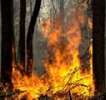
Upper Midwest States Stress Fire Safety
Wildfire Prevention Week is taking place in Minnesota, Wisconsin, Michigan, and the Canadian provinces of Manitoba and Ontario, all of which jointly declared this week to raise awareness of outdoor fire hazards. Michigan's Department of Natural Resources says a dry April is keeping firefighters busy responding to numerous fires, while counties in the west-central portion of Wisconsin are rated moderate or high for fire danger by the Wisconsin DNR and the western and southern portions of Minnesota are rated at moderate fire danger, with burning restrictions in place for larger portions of the state, according to the Minnesota Department of Natural Resources. A moderate rating meaning fires start easily and spread at a moderate rate.
"Most wildfires occur in the spring, between the time when snow melts and the grass turns green," said Minnesota DNR Forester Larry Himanga. "As fuels thaw, they become very dry. Without adequate spring rain, we're busy chasing fires." Spring is also the season when cabin owners and residents clean up their yards after a long winter. They may be tempted to burn a pile of brush or leaves but should realize a permit is required. "Often, we come upon a fire that was burning the night before and the landowner thought it was out," Himanga said. "Sometime people are returning from work while we are packing up hoses after fighting a wildfire on their property or their neighbor's property, due to the fast spreading flames."
More information on wildfires, wildfire prevention, fire restrictions, burning permits, fire management, education, and assistance is available here.
Michigan DNR Wildfire Prevention Specialist Paul Kollmeyer says careless burning is the leading cause of wildfires in his state. He stressed these tips:
- Always obtain a burn permit before lighting any rakings or brush piles. Northern Michigan residents can easily obtaining a permit by going to www.michigan.gov/burnpermit or calling 866-922-2876 to get the latest fire danger and permit information. When burn permits are not being issued, it's due to outdoor burning being prohibited by law or high fire danger makes it unsafe to burn, which has been the case in many locations already this year.
- Always have garden tools available to scrape away combustible vegetation and never leave a fire unattended even for a minute. Be sure all fires are completely out before you do leave. Keep a good water supply on hand and use plenty to douse any remaining embers; covering a fire with soil can insulate the heat allowing coals to smolder for days.
- A person who negligently allows a fire to escape or is burning illegally can receive a fine and be charged for the cost of putting out the escaped fire. However, wildfires cost everyone through resource and property damage. By preventing fires we all can benefit from the savings.
For more information on wildfire prevention, go to www.michigan.gov/dnr-fire.